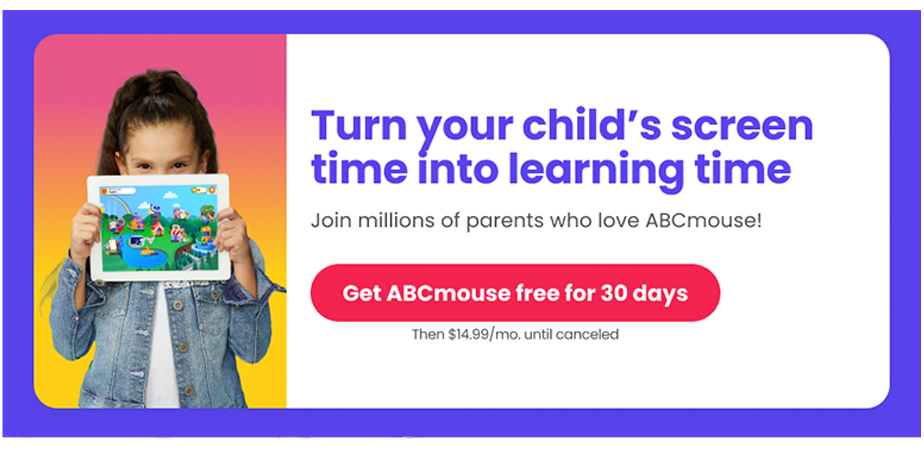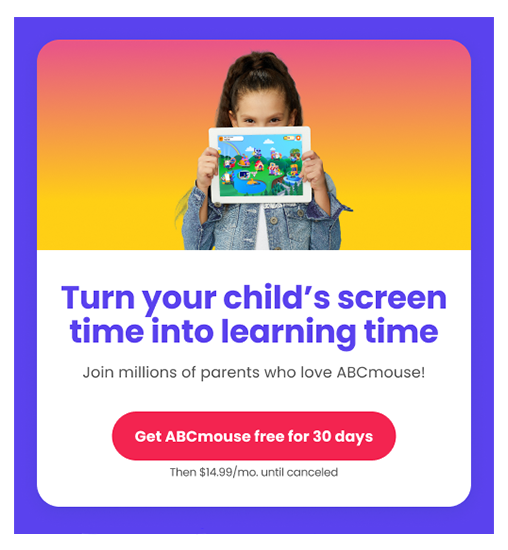

Beyond Screen Time: ABCmouse Doubles Early Learning Gains in Math and Reading
Research study shows that ABCmouse improves children’s literacy and math skills.
Key Findings: ABCmouse boosts reading and math skills
- Pre-kindergarten children who used ABCmouse for about 3.5 months demonstrated 2.5 times greater growth in their phonological processing skills in comparison to their peers who did not use the program.
- Children who used ABCmouse also demonstrated 1.6 to 2 times greater growth in their quantitative reasoning
and applied math problem solving skills relative to their peers who did not use the program. - 9 out of every 10 parents indicated that ABCmouse had a positive impact on their children, and all parents indicated that they would recommend the program to another friend or a parent.
- In interviews, parents reported that ABCmouse’s combination of engaging interactive content and comprehensive coverage of early learning topics led to observable improvements in children’s foundational skills, especially in literacy, communication, and school readiness.
ABCmouse Research Study Overview
In an era where digital technology permeates every aspect of modern life, early childhood educators and caregivers face a dilemma: how to balance the potential benefits of educational technology with concerns about screen time exposure among young children. While concerns about excessive screen time are well-documented1, emerging research suggests that the quality and the context of digital engagement may be more critical than quantity alone. The American Academy of Pediatrics recommends one hour per day of high-quality programming for preschool-aged children2, and a systematic review of studies of digital intervention for young children found that interactive, educational digital content, when appropriately designed and implemented, can support early literacy and numeracy skills development.3
However, there remains a significant gap in our understanding of how specific digital learning platforms affect developmental outcomes in very young children, particularly those aged 3–5 years. This study examines ABCmouse’s effectiveness as an educational tool for preschool-aged children, used in the home between February to July 2023, during a period of normalized post-pandemic educational practices.
The ABCmouse Program
ABCmouse Early Learning Academy is a comprehensive digital early learning resource for children in preschool, prekindergarten, kindergarten, 1st, and 2nd grades. Informed by research on how young children learn and what motivates them to learn, ABCmouse offers more than 10,000 Learning Activities and 850 lessons encompassing all major academic subject areas, including literacy, math, science, social studies, health, art, and music.
ABCmouse Learning Activities are regularly updated to encourage children to explore new content based on studies demonstrating connections between curiosity, exploration, and learning. Additionally, given the research showing relationships between learner choice and learning, ABCmouse offers games, books, puzzles, songs, and videos that children can choose independently based on their interests, as well as lessons on the Step-by-Step Learning Path, a structured curriculum that provides predesignated activities at the child’s level.
In sum, ABCmouse focuses on making learning fun, fostering children’s curiosity, and promoting their confidence as learners, all of which can contribute to children’s cognitive and socioemotional development. It can be used on smartphones and tablets as an app, as well as on computers through a web browser.
ABCmouse Research Study Participants
In January 2023, Age of Learning researchers recruited a total of 253 children (3-, 4-, and 5-year-olds) through eighteen community organizations, childcare centers, and schools across three cities in California and Texas. Recruitment flyers (English and Spanish) were distributed through principals, community organization leaders, and educators, as well as by a bilingual member of the research team at pick-up and drop-off times at childcare centers. Electronic copies of the flyers, as well as QR codes / links to an online consent form were also distributed, inviting parents to have their child participate in the study. The primary school districts in which the cities are located served student populations comprised of 44–68 percent Hispanic/Latino students, who lived in communities where the median household income ranged from $56,587 to $72,772, and where 86 to 90 percent of the households had broadband internet access.
ABCmouse Research Study Design and Procedures
A total of 25 assessors were recruited across the three sites and trained to administer the Woodcock-Johnson IV (WJIV)4 to participants. The WJIV is a battery of standardized assessments used to evaluate a wide range of cognitive abilities, and we selected 7 assessments targeting foundational literacy and numeracy skills to measure participants’ achievement and cognitive abilities at the beginning and at the end of the 6-month study period. The skills assessed were: letter and word identification (Letter-Word Identification); decoding (Word Attack); phonological processing (Word Access, Word Fluency, Phoneme Substitution); number sense and operational skills, including problem solving and mathematical reasoning (Applied Problems); and pattern and quantitative reasoning (Number Series).
All assessors had at least a bachelor’s degree in education, psychology, or a related field, and all attended two training sessions designed to help them understand the assessment, as well as common issues that may occur while administering the assessments to young children. After each test administration session in the field, the assessors met with the research team to debrief and share best practices. The pretest (Form A) was administered between early February and early March 2023, and the posttest (Form C) was administered between early July and late September.
The study employed a randomized controlled trial design. After pre-assessments were completed at each site, participants of that site were randomly assigned to either use ABCmouse or to continue with their usual afterschool activities, with the randomization process designed to ensure balance between groups based on gender, age, and baseline performance (see TABLE 1 for distribution of children by age across control and treatment groups).

Parents/caregivers in the treatment group were asked to have their child use ABCmouse for at least 15 minutes a day, 4 times a week (or at least 1 hour per week) at home between February and July 2023. They were asked to have their child prioritize completing the activities in a curated playlist of 10 literacy and numeracy activities that were created each week and displayed prominently in a section of the dashboard called “My Lessons.” If they finished everything in the playlist for the week, they were encouraged to go to “My Learning Path” or explore other parts of ABCmouse until the following week, when a new playlist of literacy and numeracy activities became available under “My Lessons.”
Usage was monitored weekly, with email reminders and encouragements to parents / caregivers of participants who were lagging far below the 60-minutes-per-week threshold. Children without access to a tablet and/or internet were provided with the equipment to enable them to participate.
Among the 253 children recruited for the study (121 control, 132 treatment), 100 control children and 110 treatment children had both pre- and post-assessment scores. Six children (2 control, 4 treatment) who required specialized educational support were excluded from analyses, as well as 5 control children who played ABCmouse, resulting in a sample of 93 control and 106 treatment children. Of the 106 students in the treatment group, 96 students were active in the program, averaging 83.81 minutes per active week (SD = 58.56) over 11.14 active weeks (SD = 5.28). They spent on average, 18.1 total hours (SD = 18.94) using ABCmouse and completed an average of 24.79 unique learning activities (SD = 13.5).
Additionally, given the need for adequate, consistent usage of any intervention program in learning, 41 treatment children who did not meet the minimum requirement of using the program an average of 2 days per week were also excluded from analyses. The final analytic sample included 93 control and 55 treatment children. These 55 treatment children who used the program with fidelity averaged 108.94 minutes per week (SD = 65.02) over 13.15 active weeks (SD = 5.25). They spent, on average, 25.77 total hours (SD = 21.61) using the program and completed an average of 29.91 learning activities (SD = 14.3).
ABCmouse Research Study Results
Finding 1: Pre-kindergarten children who used ABCmouse for about 3.5 months demonstrated 2.5 times greater growth in their phonological process skills in comparison to their peers who did not use the program.
Students’ raw scores on each assessment at pre- and post were recorded, and the differences between the postand pre- scores for each assessment were examined. FIGURE 1 below compares the change scores between pre and post for children who used ABCmouse (Treatment, or T) and their peers who did not use the program (Control, or C).
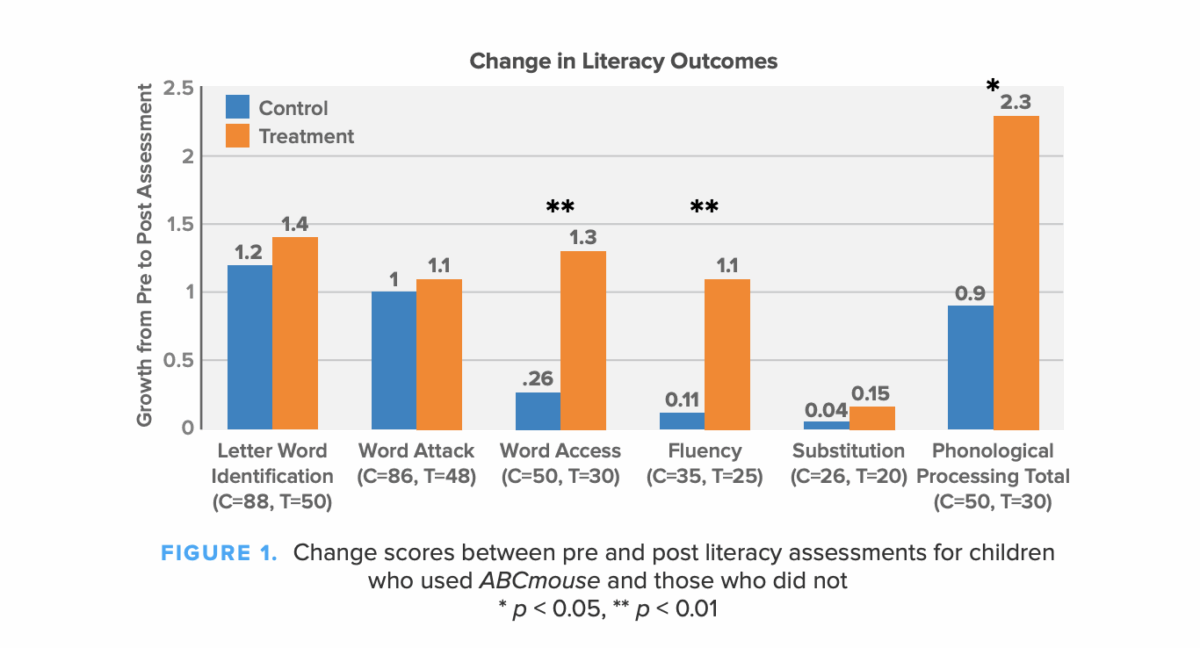
The graph illustrates that children who used ABCmouse showed greater gains across all measured literacy skills compared to the control group, with statistically significant differences in Word Access, Fluency, and Phonological Processing. Focusing specifically on phonological processing skills, ABCmouse users achieved a 2.3-point growth compared to 0.9 points in the control group, a 2.5-fold increase that underscores the program’s effectiveness in developing this set of crucial early literacy skills.
Finding 2: Children who used ABCmouse also demonstrated 1.6 to 2 times greater growth in their applied math problem solving skills and quantitative reasoning relative to their peers who did not use the program.
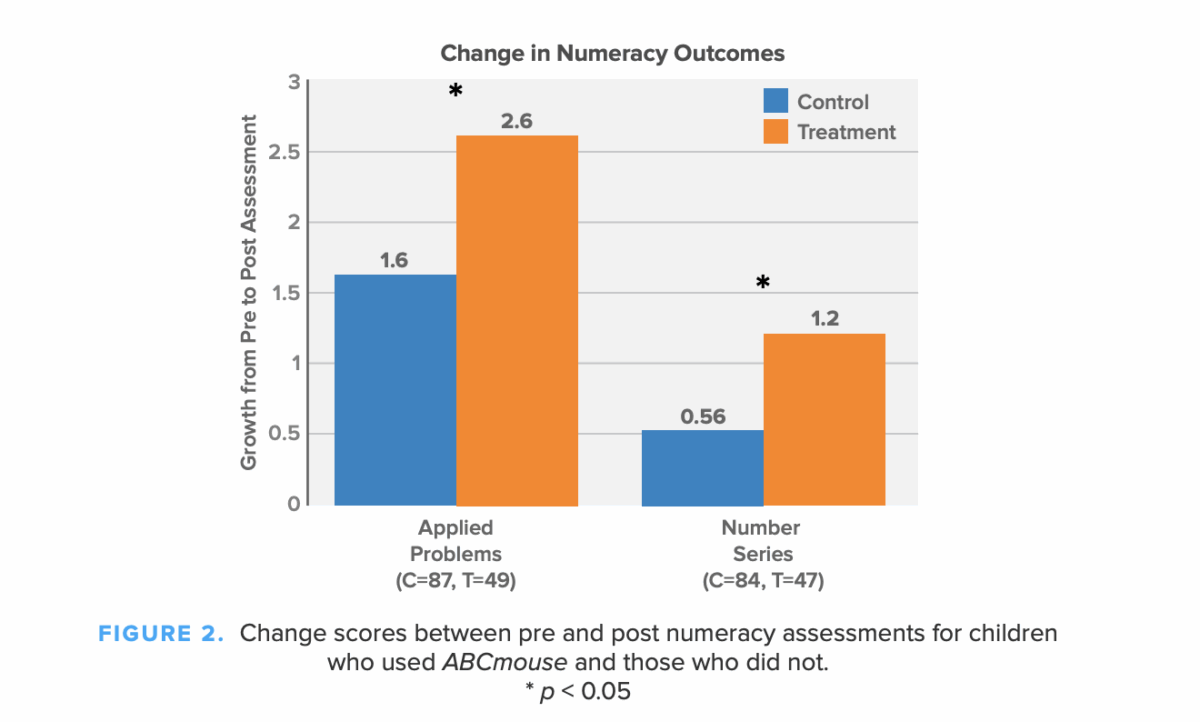
The results indicate that children using ABCmouse significantly enhanced their numeracy skills. In other words, ABCmouse users achieved about 1.6 times greater growth in their ability to analyze and solve practical math problems using mathematical reasoning. They also achieved about 2.1 times greater growth in their ability to solve math problems by finding patterns, working with numbers and quantities, and using logical thinking to figure out new problems they have not seen before.
Finding 3: Nine out of every 10 parents indicated that ABCmouse had a positive impact on their children, and all parents indicated that they would recommend the program to another friend or a parent.
A total of 71 parents/caregivers completed surveys at the end of the study. Nine out of every 10 parents indicated that ABCmouse had a positive impact on their children’s knowledge and skills in literacy, music, and art. FIGURE 3 shows the percent of parents who reported “very positive,” “positive,” or “neither positive nor negative” impact of ABCmouse on various subject areas for their children.
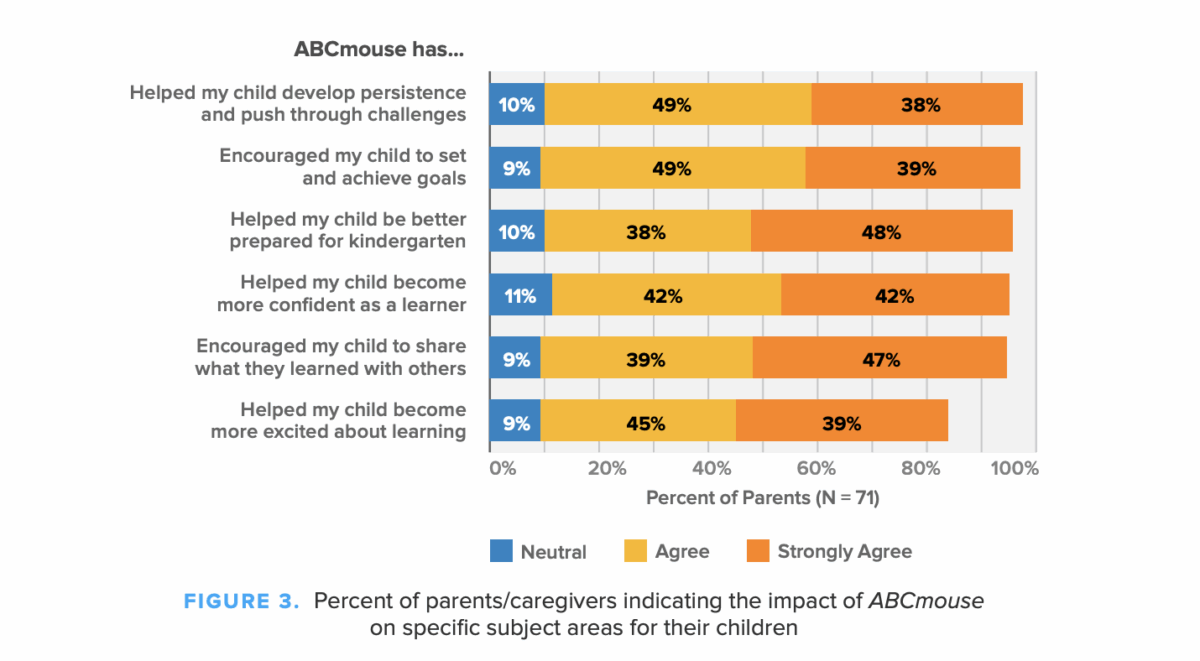
Additionally, at least 8 out of 10 parents / caregivers indicated that ABCmouse helped their child develop confidence and persistence as learners, while helping them to be better prepared for kindergarten. FIGURE 4 shows parents’ reports of how ABCmouse has affected their children’s learning attitudes and readiness, beyond academic skills.
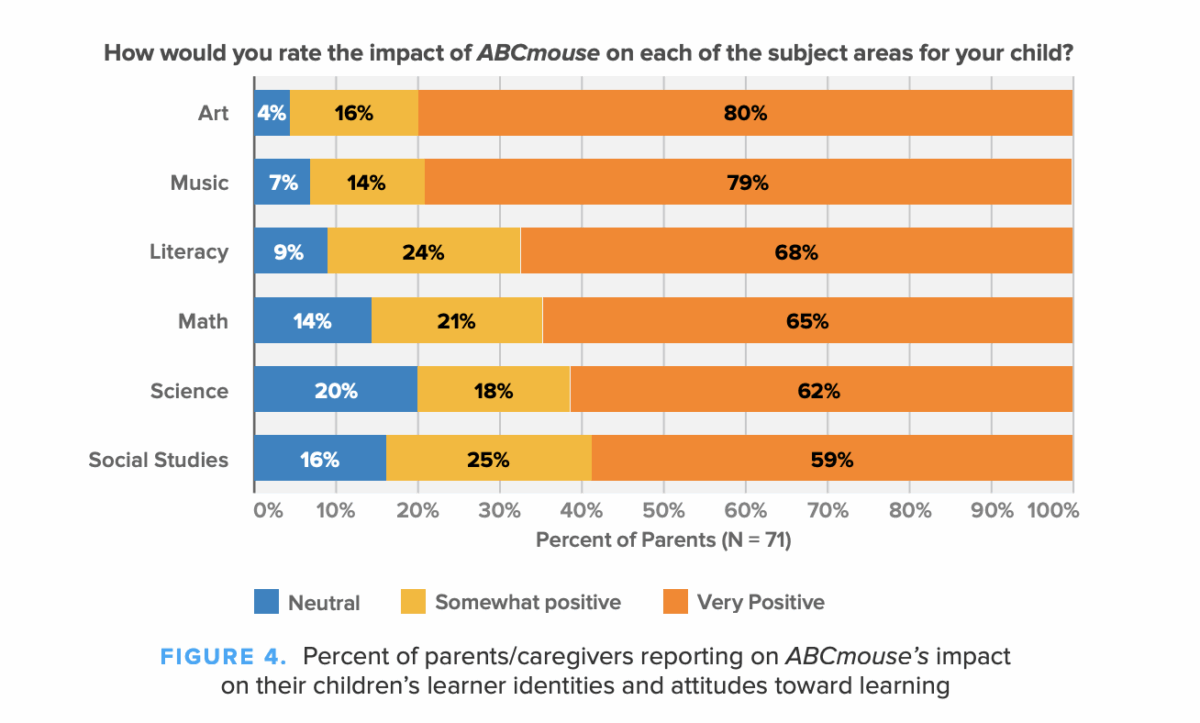
The results demonstrate overwhelmingly positive parental perceptions of ABCmouse’s educational impact, especially in arts and humanities subjects. The fact that zero parents reported negative impacts across any subject areas, and that the lowest rating was neutral, suggests that ABCmouse consistently delivers valuable educational content across all subject areas from parents’ perspective.
What makes these findings especially meaningful is that they address critical non-academic skills (e.g., learning dispositions, learner identities, or academic enablers) which are fundamental to long-term academic success. The high percentage of parents/caregivers reporting improved confidence, persistence, and goal-setting behaviors suggests that ABCmouse helps develop not only knowledge, but also essential learning behaviors and attitudes that will serve children throughout their academic careers.
Finally, all parents/caregivers indicated that they are likely to recommend ABCmouse to a friend or
another parent.
Finding 4: In interviews, parents reported that ABCmouse’s combination of engaging interactive content and comprehensive coverage of early learning topics led to observable improvements in children’s foundational skills, especially in literacy, communication, and school readiness.
Seventeen parents/caregivers volunteered to participate in end-of-study interviews, which provided insight into how both parents and children engaged with ABCmouse.
While parents/caregivers spoke extensively about their children’s enjoyment and engagement with the program, some of the most compelling comments reflected ABCmouse’s impact on learning and development.
One parent/caregiver spoke about her son’s ability to transfer knowledge from the app to real life, demonstrating multiple areas of development (speech, reading, shape recognition):
“He’s identifying different shapes around the house…. So just seeing how he can see it on the tablet and then how he would connect it to real life. It has also helped him a lot with communication …he’s talking to the tablet and talking back to the programs.… he is talking a lot better… and reading too. And it kind of blew my mind because he is pretty much reading now. We’ll go out somewhere and he’s reading off the menu pizza, fries…. So one day I started typing words in the Word document and he was reading them off, colors and numbers and days of the week” (Parent of 3-year-old boy, CA)
FIGURE 5 shows screenshots of several games available in ABCmouse where students practice foundational reading skills.
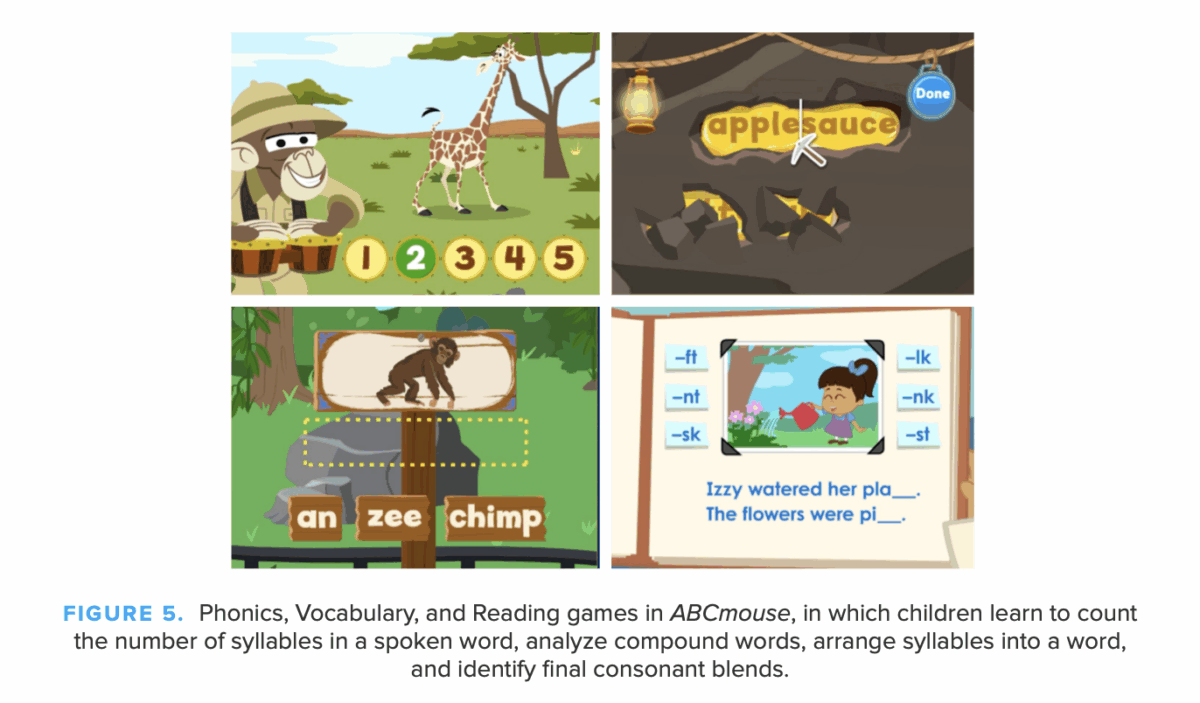
Another parent/caregiver highlighted the power of ABCmouse in translating learning into real-world physical skills and motivation:
“ABCmouse has made it so interesting for her to learn the numbers, to learn her letters. And even right now, I think she’s on the steps where it’s helping her trace the numbers and trace the letters, and she’s picked up more of the pencils and picked up her crayons to want to do more of the letters and the numbers.” (Parent of 4-year-old girl, CA)
This kind of unprompted extension of learning from digital to physical activities is what educators and parents/ caregivers hope to see from educational technology. FIGURE 6 below shows samples of screenshots of content in ABCmouse that encourage active participation and learning through various modalities.
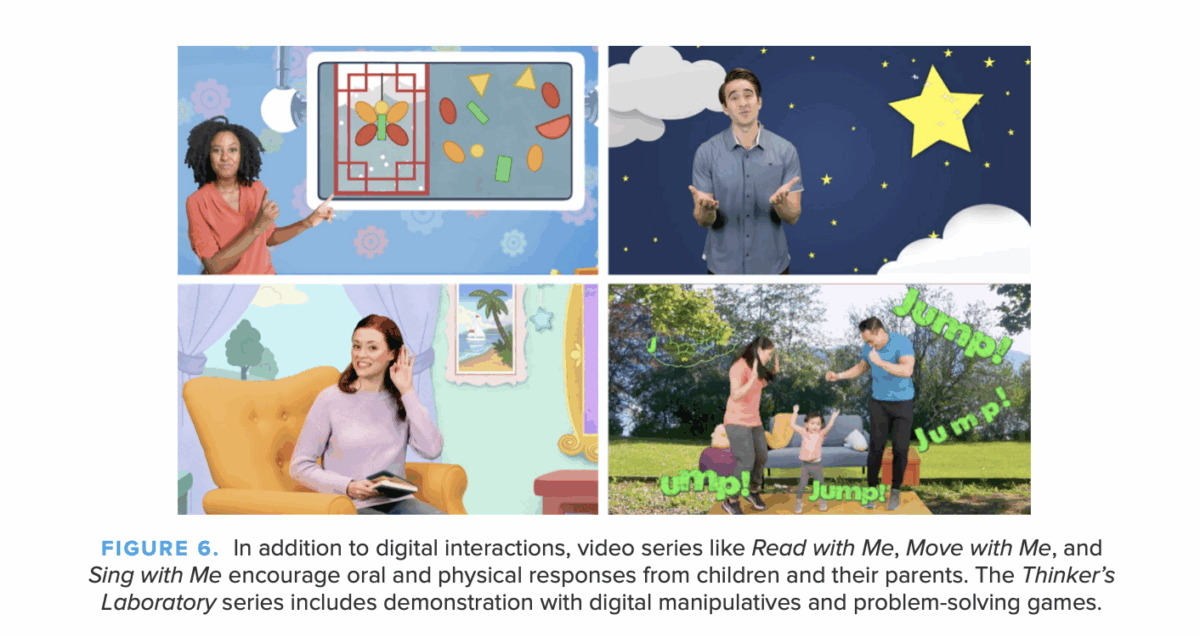
Parents/caregivers also commented on how ABCmouse naturally supports bilingual learning and language development, illustrating its value for diverse populations and its ability to bridge home and school language environments. “She’s bilingual and she would practice more for English, but she would translate it. She’s like, mom, this is in English and in Spanish. And I’m like, okay, you’re learning…. she likes learning both languages” (Parent of 5-year-old girl, TX).
Another parent indicated, “I like the whole program, how it just teaches them different things, patterns, colors, numbers. That’s something, as a parent, you want to teach’em all those things” (Parent of 3- and 4-year-old girls, CA), highlighting the comprehensive skill development that is fostered through using ABCmouse. Rather than focusing narrowly on one area (e.g., letters or numbers), the program takes a holistic approach to early learning, which is more effective for young children’s development. FIGURE 7 shows screenshots of sample ABCmouse games in which concepts are taught in interconnected way rather than in isolation.
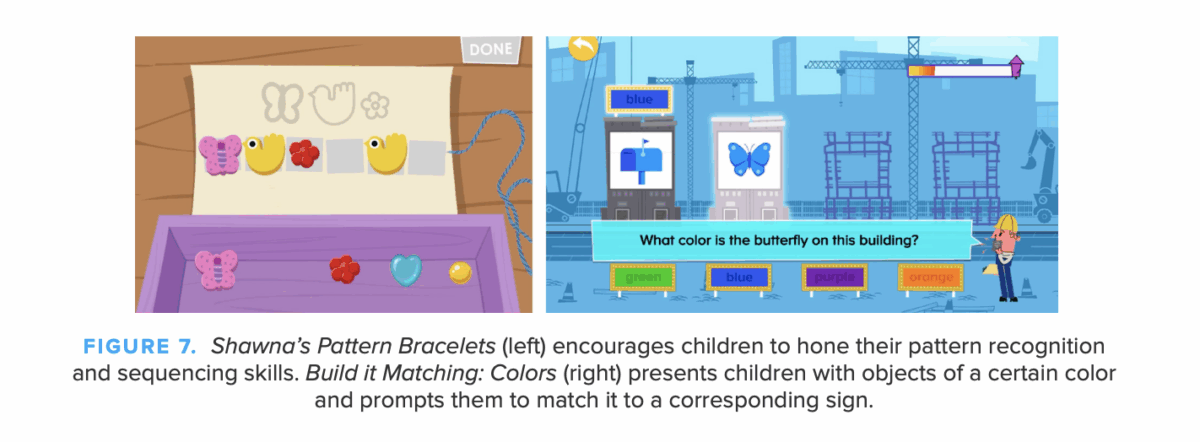
A perhaps unexpected, but valuable benefit of using ABCmouse was that it created opportunities for family learning and sibling interaction. Parents/caregivers reported that their children’s enthusiasm for learning through ABCmouse naturally extended to sharing experiences with siblings and other family members, creating an enriched learning environment at home.
One parent/caregiver described how her child’s learning became a shared experience:
“Her favorite experience is her talking to her sister about it. She’s like, I learned this, I learned…Look. And her sister’s like, oh, can I try it?” (Parent of a 4-year-old girl, CA)
Such observations indicate how digital learning can enhance rather than isolate social interactions and how it can transform individual screen time into shared family learning experiences. They also suggest that ABCmouse not only supports children’s academic growth but also helps create a culture of learning within the home, where knowledge and achievements are shared and celebrated among family members. This kind of family engagement is widely recognized as an important factor in early childhood educational success.
ABCmouse Research Study Conclusion
The results of this study demonstrate that ABCmouse can significantly enhance early learning outcomes when used consistently at home. Children who used ABCmouse showed dramatic improvements across multiple areas, from 2.5 times greater growth in phonological processing to twice the growth in mathematical reasoning compared to their peers. Beyond these academic gains, the program fostered crucial learning behaviors like persistence and confidence, while supporting bilingual development and school readiness.
These findings are particularly significant considering that quality early learning experiences are essential for kindergarten readiness and long-term academic success. While concerns about screen times are valid, this study adds to growing evidence that well-designed educational technology, when used appropriately, can be a powerful tool for both individual and family learning. As families navigate preparing young children for academic success, ABCmouse emerges as a research-validated solution that not only engages children and delivers measurable results but also creates meaningful opportunities for family interaction and collaborative learning.
References:
1. Madigan, S., Browne, D., Racine, N., Mori, C., & Tough, S. (2019). Association between screen time and children’s performance on a developmental screening test. JAMA Pediatrics, 173(3), 244–250.
2. Council on Communications and Media. (2020). Media and young minds. Pediatrics, 146(1), e20201242.
3. Griffith, S.F., Hagan, M.B., Heymann, P., Heflin, B.H., & Bagner, D.M. (2021). Apps as learning tools: A systematic review. Pediatrics, 147(1), e2020015687
4. Schrank, F. A., McGrew, K. S., & Mather, N. (2014). Woodcock-Johnson IV Tests of Cognitive Abilities. Rolling Meadows, IL: Riverside
TM & © 2025 Age of Learning, Inc. All rights reserved. The names of other companies, products, and services are the property of their respective owners


